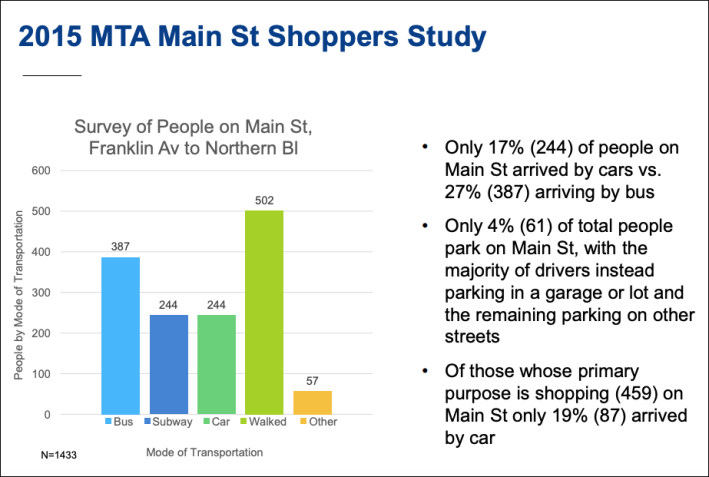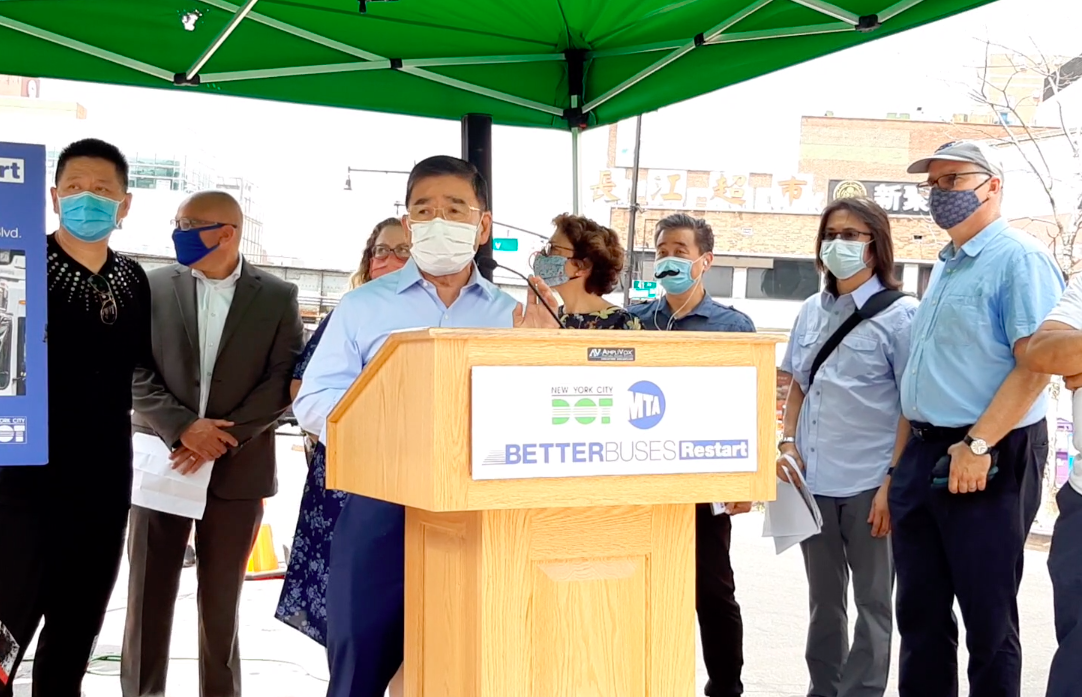Flushing busway advocates are railing against the Department of Transportation for what appears to be its acquiescence to a small contingent of busway opponents after it abruptly cancelled Monday's “town hall” on the delayed busway.
DOT quietly canceled the Aug. 3 virtual forum to promote its plan for the Main Street busway just one day after Flushing Council Member Peter Koo appropriated the Black Lives Matter movement by chanting “Business Lives Matter” to push back against the busway on the car-choked corridor. And busway advocates are now blasting DOT for further delaying a project meant to help essential workers that the mayor promised would be done in June.
"One of the goals was to make it easier for essential workers to get to work and help businesses reopen and just delaying it makes the situation worse,” said John Choe, executive director of the Greater Flushing Chamber of Commerce, who supports the busway.
Insiders speculate that DOT Commissioner Polly Trottenberg was perhaps “embarrassed” about what happened during the agency's press conference on July 30, and that the city wanted to take a step back before restarting the community engagement process with more vigor to get even more locals on board before implementation.
But the concern now is that the postponement is indefinite, and will only empower those pushing back against the busway, and other future safe-street initiatives.
“I warned DOT about the risk that this delay could empower the minority to continue sabotaging this project because now DOT is bending over backwards to accommodate their requests,” said Choe. “It’s really disappointing given all the work that people have been invested in making this a successful busway. It could derail future improvements."
These f***ing cowards are going to pull the plug on a busway everyone in the city knows we need. Unbelievable. https://t.co/K7YVx40xd4
— Second Ave. Sagas (@2AvSagas) July 31, 2020
Mayor de Blasio announced the .3-mile Main Street busway between Northern Boulevard and Sanford Avenue in June as part of five new car-free stretches to mimic the successful 14th Street busway implemented last year. Other car-free bus routes in the plan were Jamaica Avenue from Sutphin Boulevard to 168th Street in Queens, Fifth Avenue from 57th to 34th streets in Manhattan, Jay Street from Fulton to Tillary streets in Brooklyn, and W. 181st St. from Amsterdam Avenue to Broadway in Manhattan.
Main Street was billed by DOT as a project that would help about 150,000 daily riders by increasing notoriously slow bus speeds on the congested route from their average of just 3.6 miles-per-hour on weekdays and 2.1 miles-per-hour on Saturdays.
And counter to Koo's claim that a busway will hurt businesses on the strip, DOT data show that more shoppers — 27 percent — arrive to Main Street by bus versus the 17 percent who arrive by private car. And even fewer people, just 4 percent, actually parked on the usually congested corridor in front of a storefront, according to a 2015 DOT study.

One Flushing resident and straphanger said his bus commute is often so slow that it makes more sense for him to hop out and walk the rest of the way once the bus hits Sanford Avenue because the traffic is so bad.
“That works for me, thank god I'm able-bodied, but what about a senior citizen or someone with mobility issues? The idea waiting 20 minutes to go three blocks is obscene," said Joby Jacob. "I’m very disappointed [in the delay]. The busway was promised by the end of June, and here we are in August and we have no idea when it’s happening. That needs to be a priority. People who ride the bus are your constituents too.”
There's no question that some people oppose the busway, albeit for reasons that seem to reflect lack of belief in facts. A group called the Downtown Flushing Transit Hub BID claimed it conducted a survey of Main Street businesses — and the opposition was "unanimous," the group told the Queens Eagle.
“Many businesses fear that the busway will make travel to Flushing more inconvenient for customers and drive down clientele," the BID said in a statement.
But four days later, the Eagle dug a little deeper. "A plan to limit cars and facilitate bus travel along a busy stretch of Main Street in Flushing has received significant support in the community, despite pushback from some local business leaders," the paper reported. And the outlet also remembered a 2016 report that found that only 39 percent of people in the neighborhood use cars at all — more evidence that support for bus riders will appeal to the majority of the neighborhood.
Streetsblog asked DOT over the weekend why the busway town hall was canceled and was only told that it was postponed — not why. On Tuesday, the agency could not say for when it will be rescheduled, only that it will "have an update soon."






